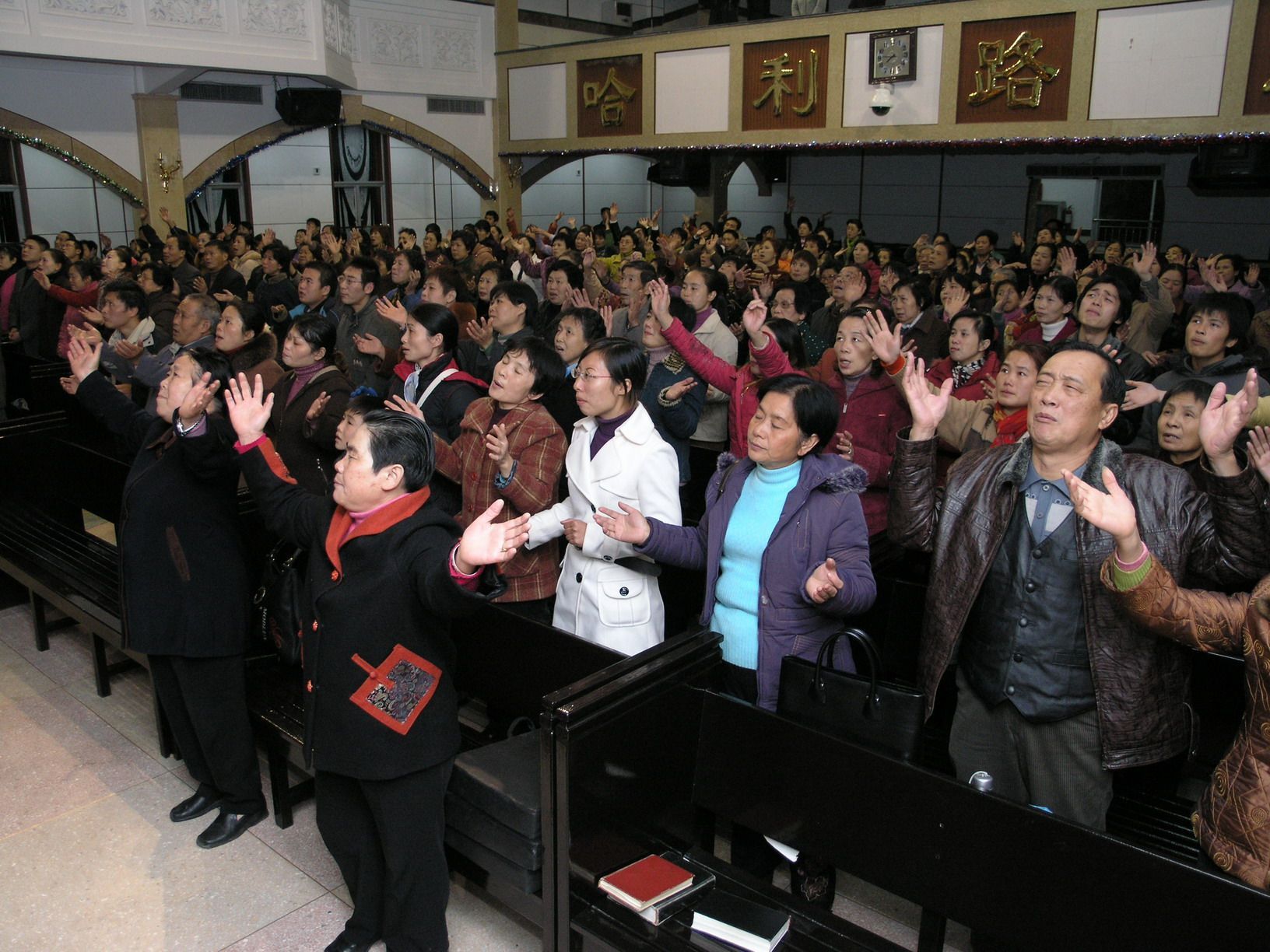2000s
A Decade of Harvest
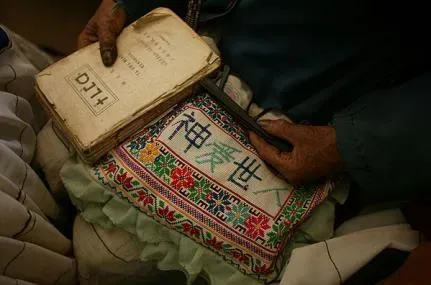
A Miao believer reading a Pollard script Bible. [Miao Messenger]
At the start of the new millennium, various short-term mission teams visited Guizhou from the United States, Singapore, Malaysia and other parts of the world. They conducted prayer walks through unreached areas, and discreetly shared the gospel when opportunities arose.
The Miao communities in eastern parts of the province were a favorite destination for mission teams. Not only were the Hmu and many other Miao tribes unreached and in urgent need of the gospel, but the people were extremely hospitable, and their vibrant and colorful cultures created unforgettable memories for the visitors.
One team of Southern Baptists from America encountered many Miao people who were hungry to hear about Jesus. One young woman was shocked to see a team of foreigners giving away their own food, water and items of clothing to poor villagers they met along the road. She chased after them and asked, "Why do you love them? You don't even know them. You don't even know me! I've never seen a love like this before."
Another prayer team visited a market town in Guizhou when they were approached by a young Miao man who wanted to practice his English. They were happy to oblige, and as they spoke he grew increasingly interested their message about God. They shared deep into the night, and the young man gave his life to Christ. He said, "I know this is strange, but I see a bright light before me, and I see a Man telling me He loves me."
The team left the town the next day, but some months later one of the intercessors returned to discover the man had led four of his friends to Jesus Christ! They only had one Chinese Bible, but were meeting together to read it. A church had been planted because of the visit of the American prayer team.
In another part of Guizhou lived a Miao man named Adam, who was blind in one eye. He was given a Chinese Bible by a foreign Christian, and when he read that Jesus healed blind people, he asked, "Do you really think this happened?" He wanted to believe in a God who had the power to heal and forgive, so he decided to give his life to Jesus Christ regardless of whether he received physical healing or not.
Adam returned to his home village, and a short time later he again visited his Christian friend. The foreigner took the opportunity to teach Adam about baptism. "Oh, I've already done that," Adam replied. "I read about it in the Bible, so I went out to the rice field and I got down in the water and said something like, 'Out with the old man, in with the new!' I dunked myself in the water and got back up. Was that okay?'"
The Love of Christ Breaks down Barriers
After centuries of conflict and racial hatred between the Han Chinese and Miao in Guizhou, the burgeoning churches among both groups found unity around the cross of Jesus Christ, where grace and forgiveness abound.
A Miao evangelist, Brother Long, was invited to address a Chinese congregation in a large city, where he shared about his recent visit to poor Miao churches. After noting that in the past there had been no chance for him to speak to a gathering of Han Christians, Long declared:
"'Our faith in Christ has changed all that. In Christ, we are all one family.' In this setting, marked by the Spirit's presence, the Miao brother felt at ease, a member of the family!
Brother Long went on to describe his recent experiences in seven remote villages. He highlighted the desperate need of one village for a church building, and he detailed how believers in another place had started a much-needed school, but were struggling to keep the project afloat....
When the service ended, the church gave over 5,100 Yuan (about US$610) toward the needs of the Miao Christians. In view of the fact that most of the Chinese believers earned about US$100 per month, this was a tremendous response."
Blanket Saturation
In the 2000s the Christian world seemed to awaken to the fact that large swathes of Guizhou remained completely unevangelized. God raised up both Chinese and foreign Christians with hearts to rectify the situation, and through a myriad of strategies the gospel went forth to multitudes of people who had never heard it before. One mission group felt called by God to blanket entire areas with gospel literature and evangelistic video and audio resources. In 2005 they reported:
"We have witnessed to over 10,000 people this year in central Guizhou. Some of these homes take up to three days to reach by walking along mountain paths. The good news is that there are no police in these remote areas so we are very safe here. Sometimes we encounter a language barrier, but we carry minority language CDs with us. We plan to finish placing the gospel into all remaining 40,000 homes in the area by the end of the year."
Many rural areas of Guizhou experienced strong church growth during this decade of harvest. Signs and wonders accompanied the preaching of the gospel, causing entire villages to believe in Jesus Christ. In one place, a woman had been demonized for years, causing great anguish to her family and disharmony to the entire community. Various cures had been tried, and local spirit priests had been summoned to try to deliver the troubled woman, to no avail.
One day a small team of Christians visited from a nearby village, and when they heard the woman's tormented screams, they offered to pray for her. Most of the villagers gathered around to watch, and as the believers calmly prayed for her, the woman's fierce countenance changed and she became calm. After some time she was restored to normal and the people who witnessed it were amazed.
That day, 120 people in the village believed in Jesus Christ. In the year following the miracle some fell away, but 70 villagers continued to stand firm in the faith.
The Martyrdom of Jiang Zongxiu
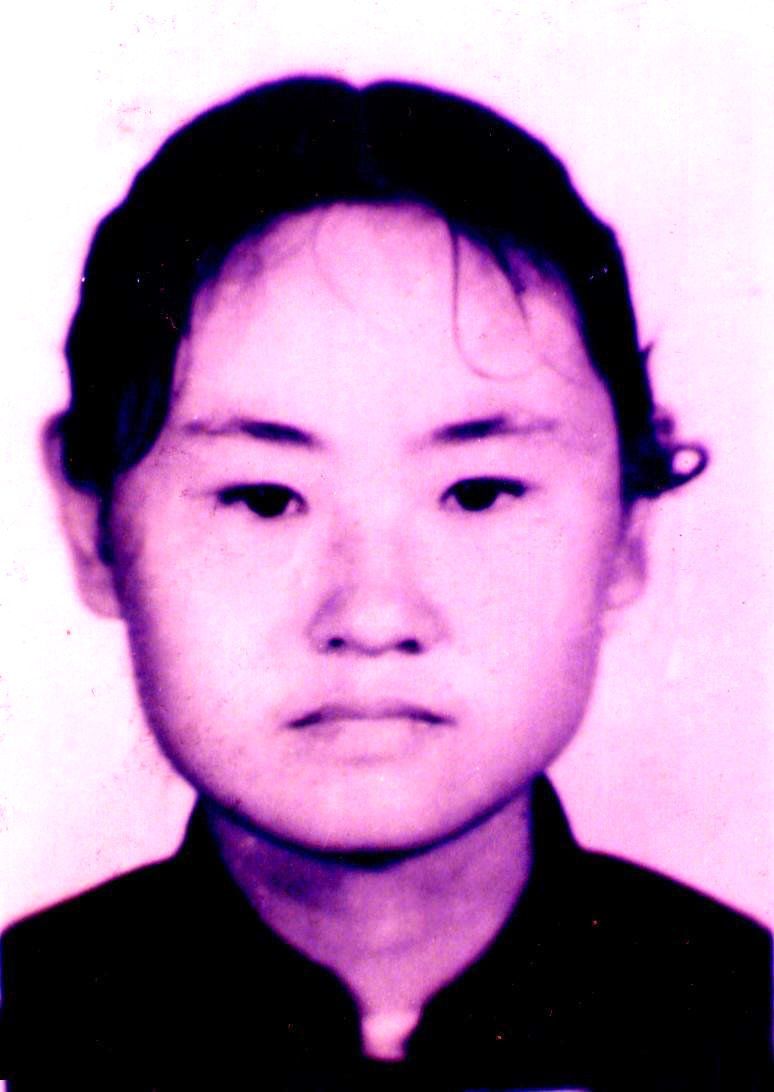
Jiang Zongxiu. [China Aid]
In June 2004, a 34-year-old Christian woman, Jiang Zongxiu, travelled to Tongzi County in northern Guizhou, where she visited the market with her mother-in-law, Tan Dewei. Both women had been active house church workers for more than a decade.
Jiang and Tan, like the Biblewomen of an earlier era, distributed Bibles and gospel tracts to some of the stall owners and their customers. Most were appreciative, but some reported their activities to the authorities. The Public Security Bureau dispatched officers to the market and arrested the Christian pair. Jiang and Tan were handcuffed together and taken to the local detention center, where they were interrogated throughout the night of June 17 and into the following morning.
Jiang and her mother-in-law were sentenced to 15 days imprisonment. The official police report listed the charge as "seriously disturbing the social order by distributing Christian literature to the masses in the market." Before they had even commenced their sentence, however, police officers beat and kicked Jiang Zongxiu to death at around 2 p.m. on June 18, 2004. Ludicrously, the official reason for her death was given as a "sudden disease."
The authorities, afraid of the ramifications of murdering someone on such a minor charge, ordered Jiang's family to immediately cremate the body, and even sent an invoice demanding 100 Yuan (about US$12) per day for the preservation of the corpse at the funeral home. Jiang's husband, Zhang Zhonghua, refused to pay and arranged for a full autopsy to be carried out to determine the cause of death.
The relatives of the martyred woman were deeply angered by the incident and publicized it widely. Even China's Legal Daily, a newspaper edited by the Chinese Department of Justice, reported the story and mocked the Tongzi officials' claims that Jiang had died of natural causes.
Numerous people signed affidavits stating that Jiang Zongxiu had been a strong and healthy young woman with no medical problems. Even a policeman present at the autopsy said, "She doesn't need an autopsy, because it's very obvious that she was beaten to death."
Jiang's sister-in-law secretly took photos of the battered and bruised corpse. Much of her hair had been torn from her scalp. Relatives who "saw Jiang's body in the funeral home all claim that they saw much blood on her body and scars from beatings on her legs and neck. The publication of the photographs, as well as a video of family members outlining what had happened, caused great embarrassment and anger among the authorities, who threatened the family with retribution if they continued their campaign for justice.
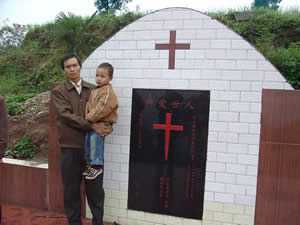
Jiang Zongxiu's husband and four-year-old son grieving at her tomb. [China Aid]
Jiang Zongxiu had touched many lives for Jesus Christ. She left behind a loving husband and a four-year-old son, Zhang Jun, who couldn't understand what had happened and frequently called out for his mother. Jiang's sister-in-law asked, "We are just ordinary Christians. All of our family is illiterate. We just want justice. They killed my sister because she was caught sharing her faith. Why did she have to die? Why does her four-year-old son have to grow up without a mother?"
Humbled at a Miao Worship Service
As foreign Christians gained more access to China in the new millennium, some boldly traveled to remote tribal areas and enjoyed rich fellowship with believers who had been starved of contact with overseas Christians for decades. One Western believer, Luke Wesley, shared his experiences following a visit to a remote Miao village:
"I arranged for a van to take us as far up the mountain as possible. The village we were to visit was located in a remote and very poor area of the province. The road conditions were rough and finally, with a gasp, the driver pulled over and said that he had driven as far as possible. We would need to hike the rest of the way.
After a short hike, we arrived to the sort of welcome that only the Miao can give. Believers lined the path singing songs of welcome and encouragement. They led us in this manner into the church. Although the population of that village was less than 200, a sea of over 250 smiling faces had packed into the church....
The service began, and I was quickly reminded that there are few things as humbling as participating in a Miao worship service. You see, the Miao assume that everyone can sing. They are wonderful singers and their choirs are renowned for the exquisite beauty of their songs. It does no good to protest—visitors must always contribute at least one song....
Afterwards, the Miao choir assembled at the front and began to sing. The power and beauty of their worship was breathtaking. Our team sat in awe as these simple people from the mountains—a people who, prior to receiving the gospel a little over 100 years ago were viewed as savages—sang songs that would have been welcomed in any cathedral in the world. And then their children's choir sang. It was wonderful....
After the singing came to an end, our team shared about God's love and His power to change lives.... The message struck a chord in the hearts of the Miao and the entire congregation rose to their feet.... The Sprit filled the place and many began to cry, shake and worship with a loud voice. It was Pentecost all over again, but this time in the mountains of China.
I had never seen anything like this in a Miao church. The Miao tend to be rather formal and reserved in manner and worship. But here, an incredible sense of hunger and openness to the things of the Spirit permeated the place. Formalities were laid aside as people entered into the presence of God.
In the midst of all this I noticed the driver of our van standing in the congregation and, with wide eyes, was taking it all in. I walked over and asked him what he thought about all that was going on. He replied, 'This is wonderful. I am deeply moved.' I asked him if he knew Jesus. He replied, 'No, not yet, but I am ready!'
The impact on him of God's presence and the authentic worship was evident. I shared the gospel with this man and then led him in the sinner's prayer. His face radiated with joy as we returned home that day."
Breakthroughs among the Unreached
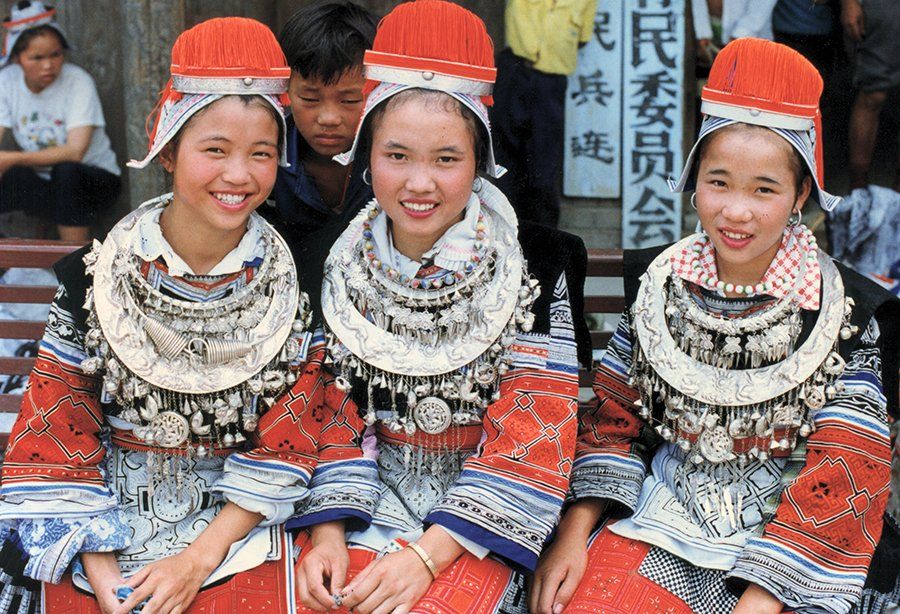
Three Ge girls in traditional dress. [Paul Hattaway]
While the churches among some minority groups in Guizhou had grown appreciably by the start of the twenty-first century, other tribes experienced the first known Christian breakthroughs in their history. One them was the little-known Mo tribe of about 20,000 people who inhabit the an area on the southern Guizhou border with Guangxi.
In 1995, a Hong Kong-based mission organization visited the Mo and won several individuals to Christ. The new converts immediately started a house church, and about 30 more Mo people became Christians in the following few years.
The Ge tribe had first heard the gospel from Australian Maurice Hutton in the 1930s, but no Christian community endured among them. In 2002, a foreign believer was led by God to visit the Ge people. She traveled to their area numerous times, building relationships with key people and sharing the gospel when opportunities arose. After one of her visits to the Ge, she reported:
"Before we knew it the Lord opened an opportunity to share. An old man and his wife and their elderly neighbor and daughter came and sat down with us. We shared about Jesus Christ as a young man translated for us from Mandarin into the Ge language. This was one of the most incredible moments of my whole year....
After we shared from creation to the Cross, the old man said he wanted to follow Jesus and the young man also professed faith in Him. I can only imagine what a sweet sound it was in the Father's ears to hear His name called upon in the Ge tongue."
The Gospel Finally Reaches the Shui
A similar breakthrough occurred among the Shui people. The early missionaries had been unsuccessful in their efforts to establish churches among the Shui, but in 2001 an American Christian shared:
"There are very few Christians among this group, but God is now working among them in great power. From the onset we witnessed many miraculous healings which resulted in numerous salvations....
We asked one of the Shui brothers if his wife was saved. He said that she had only become a Christian recently. Many times he had told her of the love of God and how Christ had died for mankind to rescue them from sin, but she had refused to believe.
One day, he and some other believers prayed for a disabled friend who had been crippled since birth. He rose to his feet and walked for the first time in his life! As a result, our brother's wife was saved. Jesus Christ is alive and well in China. He is revealing Himself to people in real and living ways. The demonstration of God's power through the Holy Spirit is what will convince a dying and lost world to believe."
The kingdom of God continued to expand among the Shui people after Christians helped construct a school for their community. This gesture was so appreciated by the local people that they opened their homes and their hearts to the believers and their message of eternal life. In a short space of time, 150 Shui people placed their trust in Jesus Christ!
The Church among the Shui continued to grow, with house church evangelists from eastern China proving especially effective. One believer entered the Shui area and immediately won their respect because of his farming ability. He showed the Shui how to plow more efficiently, which resulted in increased crop yields. The evangelist refused to be paid for his advice, and said he would be content if the people gave him a place to sleep and daily food. His humble attitude and loving heart attracted many to the gospel, and as a result most of the people in three Shui villages believed in Jesus.
In 2001, a letter from Guizhou shed more light on the impact the house church evangelists were having among the Shui. It said:
"Our church is located in a remote place and transportation is inconvenient. However, the good servants of the Lord have gone to the trouble of traveling a long distance from Zhejiang Province to this impoverished and destitute place where the Shui minority group lives in order to share the gospel with us. The brothers didn't mind climbing mountains and wading across rivers. They got blisters on their feet, but they never complained. In a remote and backward place like Guizhou, they willingly endured hard work and planted many churches."
Today, there are estimated to be approximately 1,000 Shui Christians in Guizhou. Although this number represents a tiny fraction of the half million Shui people, the light has pierced the darkness at long last, and there are strong hopes that the kingdom of God will continue to grow among the Shui as people's lives are transformed by the power of the Holy Spirit.
Massive Growth Reported
Estimates of the number of Christians in Guizhou were difficult to obtain in the decade from 2000 to 2009. The Three-Self Church appeared to pause its reporting for the decade, perhaps not wanting to alert the national authorities of the true size and scope of Christianity in the province. On the ground, however, it was clear that strong growth was continuing. Many churches were packed out each Sunday, and multitudes of enquirers expressed an insatiable desire to be taught the Word of God.
The respected mission book Operation World provided it own analysis of Christian influence in Guizhou, with their figures between the 2001 and 2010 editions of the book revealing a substantial leap in the number of believers. The 2001 edition gave a percentage of Evangelicals in the province that equated to 1.2 million believers, but by the end of the decade their number had more than doubled to nearly 2.6 million Evangelical Christians.

© This article is an extract from Paul Hattaway's book 'Guizhou: The Precious Province'. You can order this or any of The China Chronicles books and e-books from our online bookstore.




